As the tech world buzzes about new AI tools like ChatGPT, Google is racing to incorporate AI into their own products as well. At this year’s Google I/O conference in May, they announced one of the most significant changes to Google Search that we’ve seen in years, known as the Search Generative Experience (SGE).
As an SEO Manager focused on B2B and SaaS organizations, I wanted to test Google SGE to learn how our clients’ and their customers might be affected by these changes. So, I’ve spent the last few weeks performing common web searches for various B2B keywords and queries and taking extensive notes on the results I’ve seen so far.
Below I’ll share some of my findings and predictions for how the future of SGE and AI Search could affect organic traffic for B2B organizations.
Key Takeaways
User Experience
- From a user perspective, Google SGE provides clear and concise answers to your search queries directly in Google Search, but the results aren’t always perfect.
- SGE results appear similar to many existing SERP features, like featured snippets, lists, tables, and featured links, but the results cover more detail. The goal is to satisfy a searcher’s query more completely, without leaving Google.
Types of Queries & Quality of AI Responses
- Not all search queries generate AI results. For example, some financial or health related searches are excluded in order to prevent a negative impact on the users’ well-being due to potentially inaccurate information.
- In some cases, the written results took snippets word-for-word from a few sources it was pulling from, which appeared as links next to the results. However, the actual citation is unclear, and some have accused Google of plagiarism.
- Featured links in SGE include some content not currently ranked in the top 100 organic results, implying that SGE can find and feature websites even if they don’t have a lot of visibility currently.
Future Implications
- Click-through-rates for B2B and SaaS companies could be negatively impacted by these changes, but I don’t think it will be as harmful as some might fear. Brand presence can still grow even with zero-click searches, and users will still navigate to your site as they move through the funnel and begin researching and comparing solutions.
- Importantly, the product is still in an experimental phase, and Google will continue to collect feedback and make adjustments to address these and other concerns. The final version of SGE will likely be different from what we are seeing today.
What is Google SGE?
As the name implies, Google SGE uses a type of generative AI model known as a large language model (LLM) which is meant to better understand a users’ search intent, and offer more complete results directly on the search engine results page (SERP).
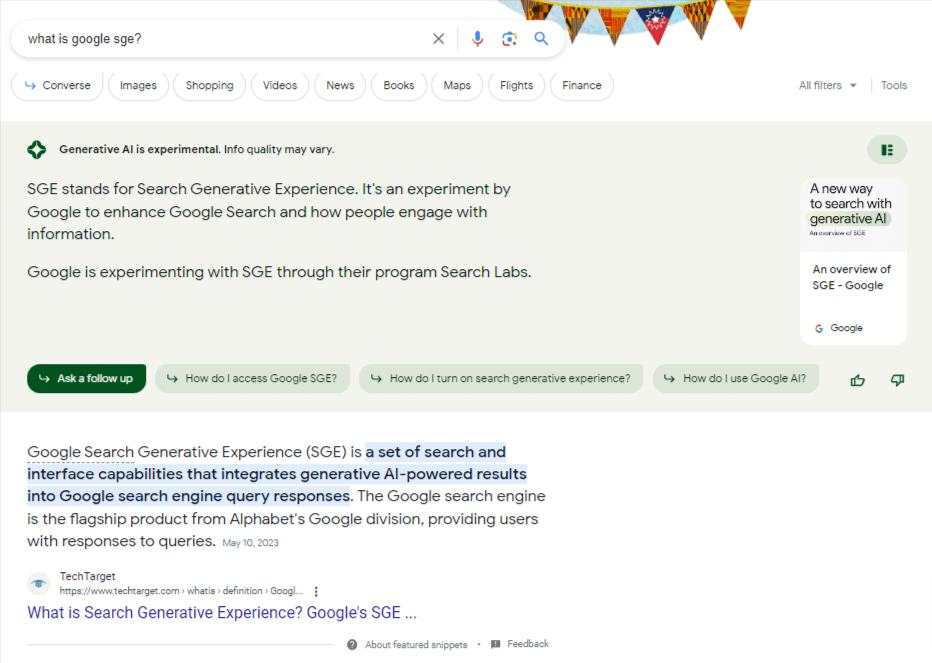
For now, Google SGE is officially listed as an “experiment’ while those involved in the beta testing program are actively providing feedback that will be used to improve the product prior to widespread adoption.
Users interested in trying it out need to sign up for the waitlist. Only a small percentage of web users have been given access so far, including SEO professionals looking to understand how this new technology could change Google Search in the future.
What Does Google SGE Look Like?
Google SGE is similar to other popular AI tools like ChatGPT, Bing AI or even Google Bard, but one big draw of Google SGE is that results are generated directly within the Google Search results page.
As a beta tester, I can view SGE results directly within the SERP after searching on Google. The results appear in a colorful band above the usual paid and organic search results. Depending on the search, an AI-generated response appears in the form of a written summary, featured links, lists and tables, local map listings, and more.
The responses look similar to some existing SERP features, but are meant to satisfy search intent more completely.
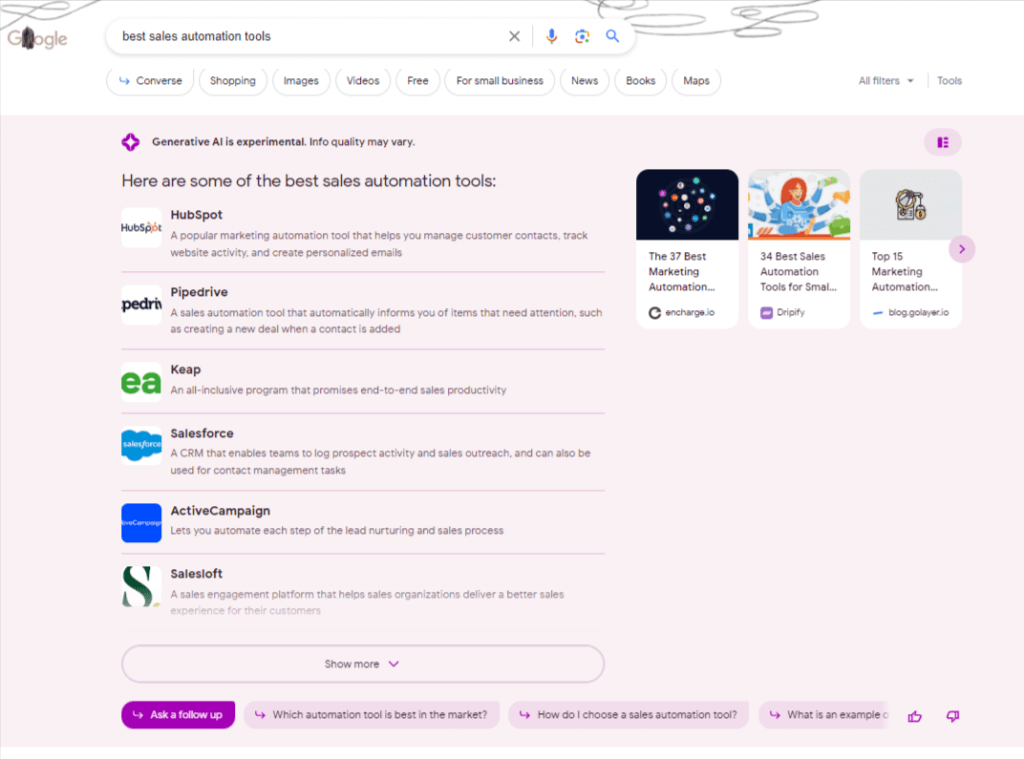
There are also buttons like “Ask a follow up” or other related questions that enable the “Converse” feature, where the user can initiate an AI chat conversation through SGE, very similar to what many of us are now familiar with from Chat-GPT.
In the above example, for the search query “best sales automation tools,” SGE returned a formatted list of top brands. Notably, there are no links to the company websites in this list. Clicking the logo thumbnail opened a window with an image search for the logo. A user might eventually click through to your website this way, but it isn’t the best experience for the searcher.
What Types of Queries Generate AI Results?
Not all queries in Google Search will generate AI results. Currently it is unknown exactly what percentage of searches will provide an AI result, as there are some topics or queries that Google still wants to avoid. Note that this could certainly change in the future as more feedback and testing is completed.
- Google doesn’t provide AI results for queries such as:
- Offensive or objectionable materials
- Some YMYL queries, related to personal or financial wellbeing
- Some brand searches
However, the vast majority of queries I tested did generate AI results, either automatically, or manually after a click of a button.
Brand Searches
I found some mixed results when it comes to brand searches. For most queries, AI-generated results did appear, with a variety of layouts and views.
Here is an example of a few different results related to searches for a large public software company, Autodesk. Each query I tested contained a short summary of the company alongside 1-3 featured links. In this case, the first linked site is the Autodesk website, while the other two are third parties including Wikipedia.
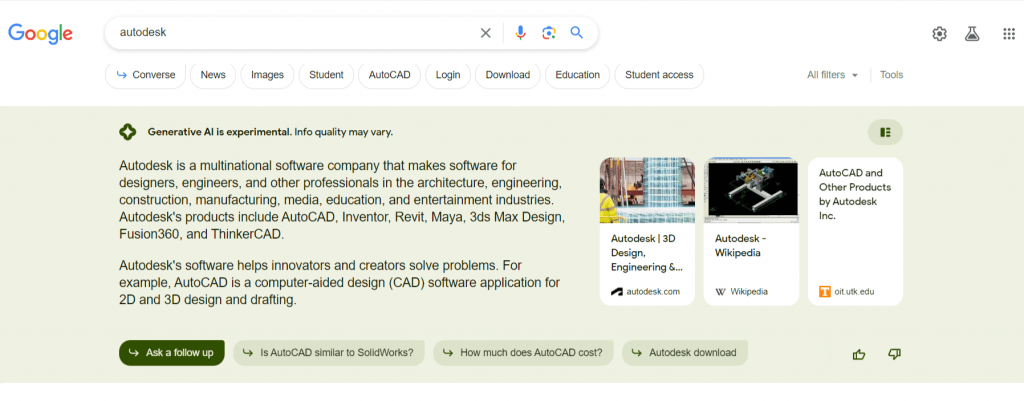
Upon further investigation, the written response appears to read as a mashup of the written content on the three featured links.
Next, I tried a new variation of the brand, a more specific product suite name: Autodesk Construction Cloud. This time, alongside the written result, all three featured links pointed to websites under the Autodesk domain.
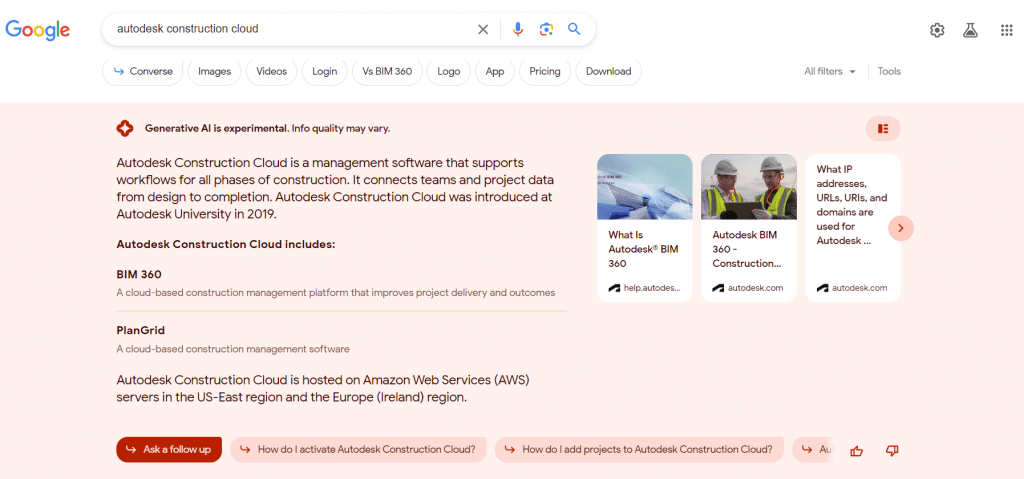
Financial (YMYL) Searches
Next, I wanted to test a query that falls in the Financial industry. Google has said that some financial queries may not generate AI results, since it falls under the YMYL category, and they don’t want to risk providing false information that could affect a user’s financial wellbeing.
I tried searching for “how to prevent payment fraud.” Interestingly, this query did not produce AI results, nor the option to generate them. Instead, the SERP looked very similar to what we see today.
This confirms that Google is avoiding providing SGE results for certain financial topics, especially when it already has various rich results and knowledge panels available to display relevant information based on the current Algorithm.

In cases where AI generated content does appear for financial queries, a disclaimer appears below the results, reading “This is not professional advice. Consulting a financial advisor about your particular circumstances is best.”
AI-Generated Snippets Eerily Mirror Content From Featured Links
Informational queries (like “what is x?”) are some of the common searches, and Google SGE could impact clicks for related top-of-funnel content. Since SGE produces user-friendly, brief summary responses to most of these types of searches, many in the B2B industry fear that website traffic could be impacted if user’s questions are answered directly within Google SGE. And I found the concern to be valid.
While at first glance Google’s SGE produces robust responses to the search queries, it also appears to “borrow” or (dare I say) copy results from sources across the web.
Here is an example. I performed a search for a top-of-funnel, informational query in the form of a question: “what is a digital wallet?”
The results generated included about three paragraphs that not only defined digital wallets, but also provided examples and use-cases. Next to the written result were three featured links, just like we saw on the Brand search examples.
However, upon further investigation, I discovered that the written results included word-for-word snippets from each of the three featured links. This included full paragraphs for several sentences in a row that were completely unchanged from the original source.
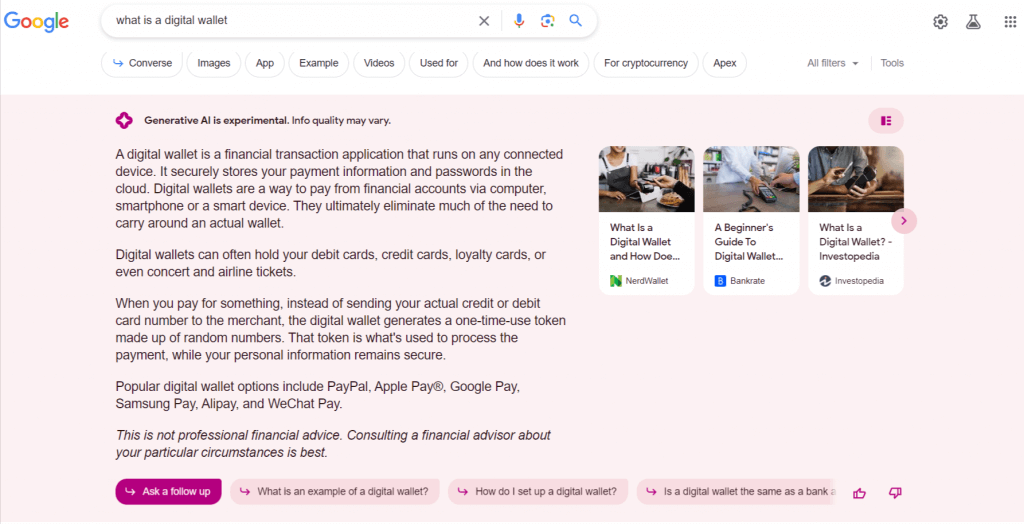
- Google SGE result: “A digital wallet is a financial transaction application that runs on any connected device. It securely stores your payment information and passwords in the cloud. Digital wallets are a way to pay from financial accounts via computer, smartphone or a smart device.
- Investopedia Original Source: “A digital wallet (or electronic wallet) is a financial transaction application that runs on any connected device. It securely stores your payment information and passwords in the cloud. Digital wallets may be accessible from a computer; mobile wallets, which are a subset, are primarily used on mobile devices.”
- Google SGE result: “When you pay for something, instead of sending your actual credit or debit card number to the merchant, the digital wallet generates a one-time-use token made up of random numbers. That token is what’s used to process the payment, while your personal information remains secure.”
- NerdWallet Original Source: “Essentially, when you pay for something, instead of sending your actual credit or debit card number to the merchant, the digital wallet generates a one-time-use token made up of random numbers. That token is what’s used to process the payment, while your personal information remains secure.”
Plagiarism Critiques by Industry Professionals
As it turns out, I wasn’t the first to notice this pattern. For an article by the Editor-in-Chief at Tom’s Hardware, the author asked Google directly about this concern. A spokesperson said “that it picks those links because they ‘corroborate’ the responses.” They also claim to always highlight the source in the snapshot.
But with the current SGE results, those sources aren’t very clearly labeled with a proper citation.
This opens up a pretty big liability for Google, so I strongly believe they will need to make some significant changes to their AI model in order to avoid this by the time SGE rolls out to the public.
They will either need to more clearly cite and link their sources directly in the written results, or their generative AI model will need to be improved to write a more unique overview of the topic. Otherwise, they could face copyright claims and other legal concerns.
I believe Google will make the appropriate changes before SGE rolls out to the public in order to avoid those concerns.
Which Content is Featured in SGE Results?
Next, I wanted to explore exactly where Google is pulling the featured links for SGE results. Does it only include the top ranked organic content, or does Google feature content not ranked on the first page?
For this example, I tested the query “prepaid card api.” Then I noted which 3 websites were included in the featured links section of the AI results, and checked to see where those pages were ranked in a normal organic search without SGE results.
What I found was surprising: Only 1 of 3 links were even ranked in the top 100 organic search results! This means that, for some reason, Google’s AI model discovered this content which would have been unranked under their current search algorithm, but determined it contained relevant enough information to use as part of its SGE results.
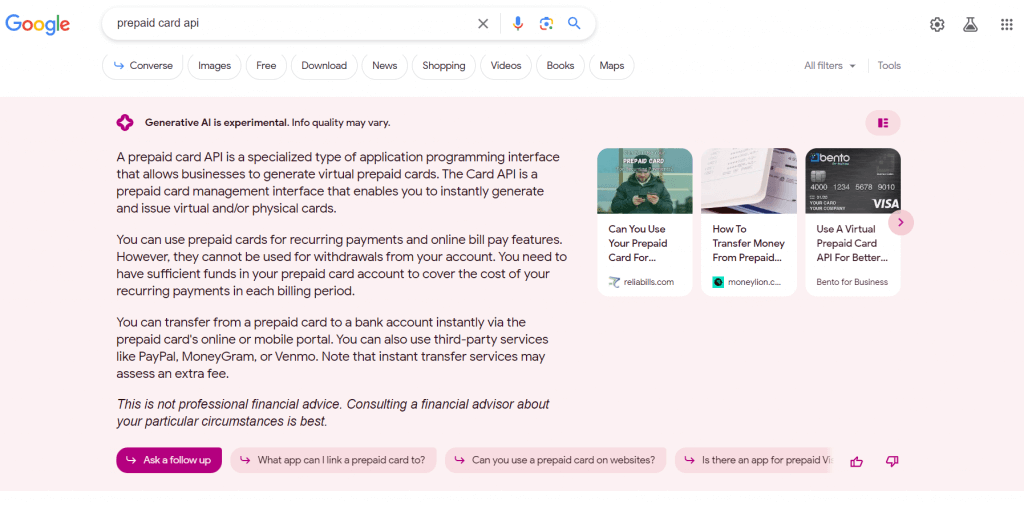
- Reliabills.com – not ranked in top 100
- Moneylion.com – not ranked in top 100
- Bentoforbusiness.com – ranked at #8
So what does this mean for the websites that would normally be unranked for this query? On the plus side, there is now a direct link to the site displayed on SGE results, which could earn some clicks and bring traffic to the site.
On the other hand, considering our previous observation that the written SGE results may be scraping content from their site to display directly on the SERP, publishers may be concerned that their valuable content is being used by Google without their consent, only for a portion of users to never click-through to visit their site.
The Next Phase of Google SGE
I want to reiterate that Google is still in an early stage of releasing SGE. Many SEOs and other beta testers are providing lots of feedback on our findings, and Google already has started implementing some changes within SGE.
The beta testing program for SGE will end in December 2023. At that time, they’ll decide whether to roll out the product to the general public, or use the technology in some other way. I believe the version of SGE being tested today is going to be significantly different from what the final version will look like.
Google needs to upgrade its AI model to avoid copyright concerns when scraping content from website publishers, whether this means implementing an improved citation method, or improving the model to generate more unique results on its own.
Regardless, one thing is for certain: AI is going to disrupt user behavior online, including how users search for and find content in the future.
Future Implications for Organic Search
There is a strong chance that organic traffic could be impacted for many publishers. If users are able to quickly find an answer that satisfies their query directly on the SERP, there won’t be a need to click through to company websites. However, I don’t believe the loss will be detrimental to B2B and SaaS brands.
Zero-Click Searches
Zero-click searches have been prevalent for some time now, “stealing” clicks and traffic from publishers. This is very unlikely to change. Google SGE will be just another type of search result from a user perspective.
Most end-users will likely not even be aware of the difference between SGE results and standard SERP features. Users simply want to find a quick and simple answer to their query.
For this reason, Google has already started introducing even more new SERP features appearing in standard search, incorporating similar views and layouts that we’re seeing now in SGE. For example, this triple featured snippet is starting to appear for some queries, which mimics the three featured links in SGE results.
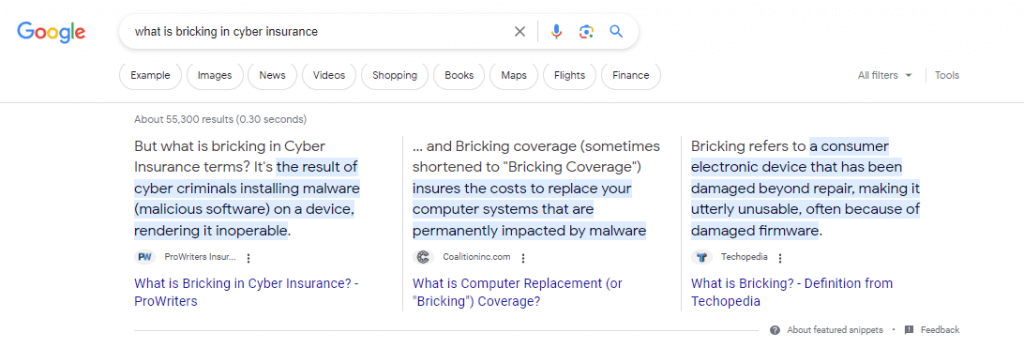
Brand Awareness and Demand Generation
B2B and SaaS companies may end up seeing a slight negative impact to organic search as more AI generated results and SERP features lead to a zero-click search.
However, through this process, prospective customers are still going to perform their research on their pain points, search for and compare solutions, and learn more about product features.
If Google features your brand name or helps users learn more about you, then you may still benefit from improved brand awareness that leads to demand generation. Users will become more familiar with your offering, and may start to build more trust.
Additionally, the solutions they are looking for can’t be answered within a few summary paragraphs.
There will still be a need for B2B organizations to provide valuable and comprehensive content on their websites to educate and guide prospective customers down the funnel. That’s why your SEO strategy should include personalized content tailored to the specific stage of the buyer’s journey. This will help address user’s pain points, providing more valuable answers than the simple summary paragraphs found on SGE results.
Lastly, make sure your measurement plans and KPIs include engagement metrics and brand vs. non-brand impressions to account for zero-click searches.
As an industry-leading expert in SEO and content marketing, Obility offers comprehensive assessments of your website and content strategy, equipping you with the tools for success in the uncertain future of Google and organic search. With the support of Obility’s in-house data team, you can track your marketing efforts from lead to revenue.
Contact Obility now to unlock data-driven marketing decisions that drive brand awareness, lead generation, and marketing revenue.
